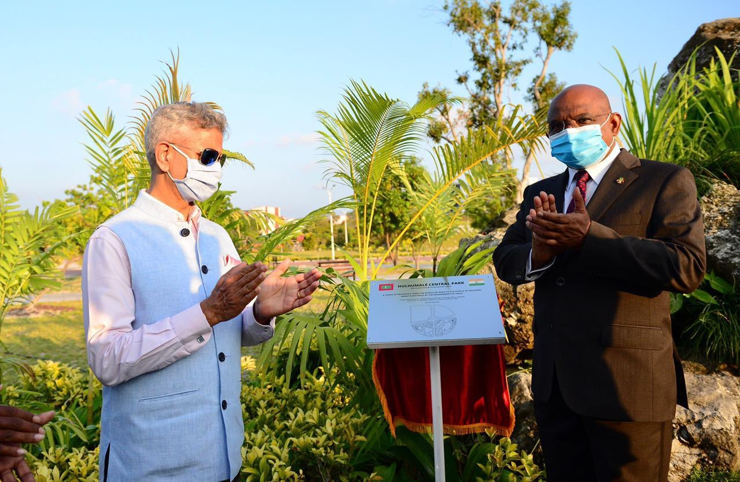

Foreign Minister Dr S. Jaishankar lends support to Maldivian Foreign Minister Abdullah Shahid (Photo: IANS)
<p>
The Indian High Commission in Male has written a letter to the Maldivian Foreign Ministry about anti-India articles in the local press and has sought protection for the diplomatic staff.<br />
<br />
Indian diplomats have been feeling uncomfortable in the archipelago after the Maldivian opposition parties mobilised a campaign in the local media against India. The anti-India sentiment was further amplified in the local social media. <a href="https://in.news.yahoo.com/upset-malicious-motivated-attacks-media-031558873.html">The letter urged Male</a> to take steps to protect India&rsquo;s diplomatic personnel from malicious articles in the local media.<br />
<br />
In Delhi, Arindam Bagchi, Ministry of External Affairs (MEA) spokesperson declined to divulge information on the developments. He said: &ldquo;I think today the Maldivian Foreign Ministry has issued a statement. The Maldivian Democratic Party (MDP) has also issued a statement. Let us leave it at that&rdquo;.<br />
<br />
The storm has been brewing for some time despite the current governments in New Delhi and Male enjoying friendly relations&nbsp;with numerous diplomatic visits at the ministerial level in recent months.</p>
<p>
<strong>Read More: <a href="https://www.indianarrative.com/opinion-news/can-the-new-un-general-assembly-president-midwife-india-s-entry-into-the-security-council-93837.html">Can the new UN General Assembly President midwife India&#39;s entry into the Security Council?</a><br />
</strong></p>
<p>
Indian Narrative spoke with Dr Adil Rasheed, Research Fellow at the Manohar Parrikar Institute for Defence Studies and Analyses, New Delhi, about the developments in the Maldives.</p>
<p>
&quot;Some of the opposition parties in the Maldives are radically against India. Whatever India does, even if those happen to be development activities, is questioned by them. They launched the &#39;India Out&#39; campaign which was vocal and disruptive. However, the government led by President Mohamed Solih of the ruling Maldivian Democratic Party (MDP), is closely aligned with India and wants to strengthen ties further&quot;, says Rasheed.<br />
<br />
The Maldivian opposition, the Progressive Party of Maldives-People&rsquo;s National Congress (PPM-PNC) is led by former President Abdulla Yameen. The party professes an Islamist ideology and looks suspiciously upon India. It is also highly anti-USA as well but had close links with China when Yameen was in power. However, the strong Maldives-China links were severed by Solih, who brought Male back into India&#39;s circle and New Delhi obliged by pumping in development assistance.</p>
<p>
<strong>Read More: <a href="https://www.indianarrative.com/world-news/terror-attacks-in-afghanistan-maldives-should-alarm-south-asia-european-think-tank-88632.html">Terror attacks in Afghanistan, Maldives should alarm South Asia: European think tank</a><br />
</strong></p>
<p>
Rasheed says that the opposition is trying to come back to power and consequently &quot;has doubled up its radicalisation push. Part of that strategy is to whip up the anti-India sentiment. But we should not be worried about the opposition as the Maldivian government sides with India and believes in the same democratic principles. The opposition might be louder but definitely not stronger&quot;.</p>
<p>
<a href="https://idsa.in/issuebrief/attack-on-nasheed-and-radicalisation-maldives-200521">With strong radical tendencies</a> in voluble existence in the Maldives, a country that occupies a strategic location in South Asia, radicalisation is morphing into terrorism. This was demonstrated when Maldivian Speaker and former president, Mohamed Nasheed, was made the target of an assassination attempt in early May. Nasheed was the first democratically-elected president and is known for his liberal outlook but was ousted for professing these ideologies.</p>
<p>
Currently, the Maldives is a nation living a divided existence&mdash;the government wants development while the opposition prefers radical Islamic ideology; tourism is the only revenue earner but is looked down upon by radicals; democratic forces want better ties with India while the orthodox elements prefer China and even though employment opportunities for the youth are low, the passage of narcotics is high.</p>
<p>
A recent paper had said that the attack on Nasheed was a pointer that democratic forces are yielding space to extremist elements. In the tinder box that is Maldives, India will have to tread cautiously.</p>
Prime Minister Narendra Modi interacted with members of the Indian diaspora here on Wednesday as…
The city of Hamburg in Germany is set to host the 11th edition of India…
The International Atomic Energy Agency (IAEA) has confirmed that two Iranian centrifuge production facilities, TESA…
The human rights department of the Baloch National Movement (BNM), Paank, has strongly condemned the…
In a major boost to India's coastal defence capabilities, the Indian Navy on Wednesday commissioned…
Volker Turk, the UN High Commissioner for Human Rights, on June 17 expressed concern over…